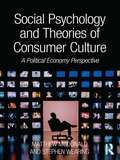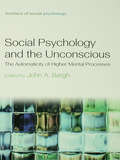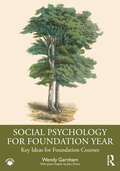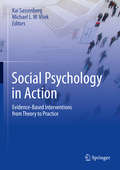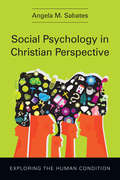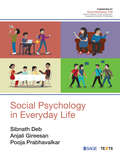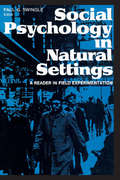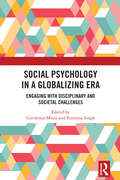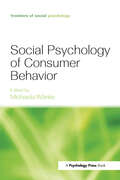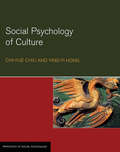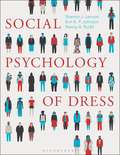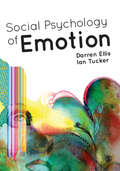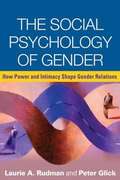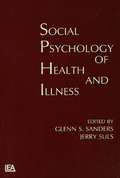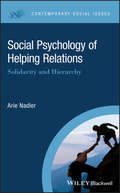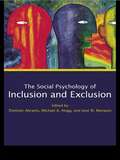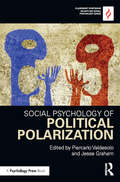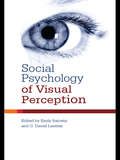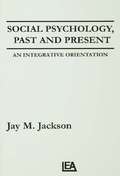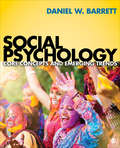- Table View
- List View
Social Psychology and Theories of Consumer Culture: A Political Economy Perspective
by Stephen Wearing Matthew McDonaldSocial Psychology and Theories of Consumer Culture: A Political Economy Perspective presents a critical analysis of the leading positions in social psychology from the perspective of classical and contemporary theories of consumer culture. The analysis seeks to expand social psychological theory by focusing on the interface between modern western culture (consumer culture) and social behaviour. McDonald and Wearing argue that if social psychology is to play a meaningful role in solving some of society’s most pressing problems (e.g. global warming, obesity, addiction, alienation, and exclusion) then it needs to incorporate a more comprehensive understanding and analysis of consumer culture. Wide-ranging and challenging, the book offers a fresh insight into critical social psychology appropriate for upper undergraduate and postgraduate courses in personality, social psychology, critical and applied psychology. It will also appeal to those working in clinical, counselling, abnormal, and environmental psychology and anyone with an interest in the integration of social psychology and theories of consumer culture.
Social Psychology and the Unconscious: The Automaticity of Higher Mental Processes (Frontiers of Social Psychology)
by John A. BarghEvidence is mounting that we are not as in control of our judgments and behavior as we think we are. Unconscious or ‘automatic’ forms of psychological and behavioral processes are those of which we tend to be unaware, that occur without our intention or consent, yet influence us on a daily basis in profound ways. Automatic processes influence our likes and dislikes for almost everything, as well as how we perceive other people, such as when we make stereotypic assumptions about someone based on their race or gender or social class. Even more strikingly, the latest research is showing that the aspects of life that are the richest experience and most important to us - such as emotions and our close relationships, as well as the pursuit of our important life tasks and goals - also have substantial unconscious components. Social Psychology and the Unconscious: The Automaticity of Higher Mental Processes offers a state-of-the-art review of the evidence and theory supporting the existence and the significance of automatic processes in our daily lives, with chapters by the leading researchers in this field today, across a spectrum of psychological phenomena from emotions and motivations to social judgment and behavior. The volume provides an introduction and overview of these now central topics to graduate students and researchers in social psychology and a range of allied disciplines with an interest in human behavior and the unconscious, such as cognitive psychology, philosophy of mind, political science, and business.
Social Psychology at Work: Essays in honour of Michael Argyle (Psychology Revivals)
by Adrian Furnham Peter CollettSocial psychology has much to offer real world problems, especially in industrial and organizational settings. Originally published in 1995, in Social Psychology at Work leading researchers in their respective fields discuss recent findings and their implications for the commercial world of work. All the contributors have been greatly influenced by the late Michael Argyle, to whom this book is dedicated. They examine aspects of the workplace from the perspectives of personality and individual difference, social psychology and organizational psychology. Subjects covered include the effects of age on work, leadership, productivity, how we are socialized for work, stress and anxiety, and the effect of the physical environment on working behaviour. Social Psychology at Work is a rich source book of ideas, research findings and reviews at the interface of pure and applied psychology. It will be important and rewarding reading for all those such as students, consultants and managers and trainers who are interested in psychology at work.
Social Psychology for Foundation Year: Key Ideas for Foundation Courses
by Wendy GarnhamIntroducing students to topical issues and controversies drawn from specific areas of social psychology, Social Psychology for Foundation Year answers a series of contemporary questions and debates by bringing together current theories and studies from a number of areas within the field.Aimed primarily at students starting out on their degree journey, this book demonstrates how psychological research can help us understand our social world. Exploring topics from the Obama effect to groupthink, from what makes a good leader to the role of social identity in riots, it demonstrates how theories and studies contribute to our understanding of human behaviour. It embraces both established theories and recent empirical evidence to enable readers to see how research is linked to practical application in psychology and empowers readers to develop a greater understanding of why we do the things we do.Social Psychology for Foundation Year is a key textbook for both foundation year and introductory psychology courses and will be of interest to anyone wanting to delve into topical issues in contemporary psychology.
Social Psychology in Action: Evidence-Based Interventions from Theory to Practice
by Kai Sassenberg Michael L. W. VliekThis timely and applied textbook brings together leading scientists to illustrate how key theories and concepts in social psychology help to predict and explain behavior, and can be successfully applied to benefit social and practical problems. It focuses on robust theories and models known for their successful applications and covers a diverse range of settings—spanning classroom interventions, health behavior, financial decision making, climate change and much more. Each chapter comprises of a theoretical section to define the key concepts and summarize the theory, providing evidence for its reliability and limitations from basic research, as well as an application section that summarizes research in an applied context and provides details about a particular study including the respective application setting. The textbook expertly shows how theory can make meaningful predictions for real world contexts, and isn’t afraid to explain the potential hurdles and pitfalls when applying a theory and its underlying set of concepts in a certain context. Crucially, this format moves towards theory testing in applied contexts, enabling a closer examination of why and under what circumstances interventions may be successful in obtaining a desired behavioral or psychological end-state.Among the topics explored:Mindset theory of action phases and if-then planningQuality of motivation in self-determination theoryThe focus theory of normative conductSocial identity theory and intergroup contact theoryIntergroup forgivenessSocial Psychology in Action is a critical resource for advanced undergraduate and graduate students in social and cultural psychology, as well as students of behavioral economics seeking to develop a deeper understanding of major theories and applications of the fields. Practitioners working in the areas of organizational behavior and management, health communication, social work, and educational science and pedagogy will also find the volume pertinent to their work.
Social Psychology in Christian Perspective: Exploring the Human Condition (Christian Association for Psychological Studies Books)
by Angela M. SabatesWhy doesn?t our behavior always match what we say we believe?How and when are we most likely to be persuaded?What is the social psychology of violence?How reliable are eyewitness testimonies?Are racism and prejudice on the decline or are we just better at hiding them?
Social Psychology in Everyday Life
by Sibnath Deb Anjali GireesanThis multi-authored textbook examines and explores the implications of a fast-changing world on social behaviour and psychology. Social Psychology in Everyday Life provides broad insights into the ambivalence of the twenty-first century, where the rising standard of living along with growing technological influence has not necessarily translated to greater happiness and contentment in our lives. The new textbook studies this conflict in the contemporary society by applying the principles of social psychology in our everyday life. Written as per the prescribed curriculum, exhaustive in its approach and covering Indian research and findings, this book strikes a balance between theoretical understanding and its manifestation in the practical facets of life. Apart from the deliberation on classical theories, the book projects the versatility of this discipline in its applications to other fields such as law, medicine and natural sciences. In an effective and easy-to-understand manner, Social Psychology in Everyday Life helps familiarize the reader with the varied aspects of social psychology. Key Features: • Focus on application of social psychology and evidence-based findings. • Dwells on the impact of social psychology in relation to contemporary socio-economic issues. • Relatable and relevant examples from everyday life, pertaining to the exposure that students have today. • Covers recent research and includes updated literature in the field of social psychology.
Social Psychology in Forensic Practice
by Joel Harvey Derval AmbroseThis book explores how different social psychology theories and concepts can be applied to practice. Considering theories from attribution theory to coercion theory, social identity theories to ostracism, the authors offer a greater understanding and appreciation of the ways in which social psychology can contribute to forensic practice. The book argues that social psychology is useful for carrying out assessments (including risk assessments), formulations, and interventions with clients in forensic settings, as well as for psychological consultation, training, and the development of services. These theories are also important when understanding multi-disciplinary and multi-agency working, staff–client relationships, and peer-to-peer relationships. Through illustrative composite case examples, taken from the authors’ experiences in forensic settings, the chapters demonstrate effective ways to pursue a theoretically informed practice. Exploring a broad range of theories and a timely topic, Social Psychology in Forensic Practice will interest a wide readership including graduate and undergraduate students and researchers in criminology, sociology, and forensic, social and clinical psychology. It will also be of practical use to health professionals and non-health professionals working in forensic settings as well as policy makers and others commissioning forensic services.
Social Psychology in Natural Settings: A Reader in Field Experimentation
by Paul G. SwingleThe study of human behavior in actual social settings is an extraordinarily complex area of research. Social behavior, unlike the controlled conditions of the laboratory, is affected by an enormous number of variables and environments. Researchers, therefore, are faced with the task of designing adequate experiments that have the sophisticated controls necessary to increase the experimenter's confidence that a relationship between a particular stimulus in a social environment and a particular social response actually exists. This distinctive supplementary text for social psychology courses gives students a real feeling for the possibilities of experimentation outside the laboratory. The reprinted and abstracted articles in this book are reports of experimental studies conducted in natural settings, and the orientation is scientific--focusing on consistencies between laboratory and field research, rather than their inconsistencies. The book discusses research on discrimination, status, prosocial behavior, dissonance, attitude change, interpersonal and group influence, compliance performance, change and rumors, honesty, and participation. The chapters were selected on the basis of both content and methodology and demonstrate particularly ingenious applications of experimental methodology to the study of natural settings. Throughout the book, the editor stresses the ethical and moral issues associated with field research, demonstrating that scientific work must be humane as well as rigorous. Social Psychology in Natural Settings is appropriate for course use at introductory as well as more advanced levels. It is instructive and useful as a reference volume for graduate students and researchers as well.
Social Psychology in a Globalizing Era: Engaging with Disciplinary and Societal Challenges
by Girishwar Misra Purnima SinghThis volume locates social psychology in the context of contemporary societies in an increasingly globalizing world where time, space, and relationships are reshaped by powerful information, communication, and travel technologies.The volume revisits the efforts thus far while commenting upon the treatment of pertinent issues in the emerging sociopolitical and academic climate of the globalized area. It discusses how globalization has led to multidimensional changes in the society, warranting newer ways of comprehending, conceptualizing, and navigating through the complexities of the emerging social world. While mapping the new changes shaping contemporary discourse, the book refers to the new emerging patterns of human relationships, which are acquiring different shapes and meanings, leading not just to restructuring but also to creating innovative ways of being and making sense of the world.The volume would be useful to students and teachers of psychology, applied psychology, sociology, social work, public health, gender, and women studies. It would also be an invaluable companion to pediatrics, forensic medicine, psychiatry, and law enforcement authorities like police and judiciary.
Social Psychology of Consumer Behavior
by Michaela WänkeThe Social Psychology of Consumer Behavior brings together the most promising and theoretically fruitful research developments by internationally renowned scholars, whose work is at the cutting edge of research. Experts from both fields – social psychology and consumer behavior – provide an informed, up-to-date overview, from an original integrative perspective. The aim of this volume is two-fold. On the one hand, the application of social psychology to consumer behavior is meant to broaden the horizon of social psychologists. On the other hand, students and researchers of consumer behavior will be offered an advanced account of relevant theories tailored to their interests. While the range of topics is rather broad – including the construal of judgments and decisions, affective and cognitive feelings, social and media influences, and goals and self-regulation – each chapter is focused on one specific theoretical or methodological perspective and thereby gives a comprehensive and penetrative account of the relevant issues and the respective research. The volume provides an invaluable resource to students, researchers, and instructors in social psychology, consumer psychology, consumer behavior, and marketing.
Social Psychology of Culture (Principles of Social Psychology)
by Chi-Yue Chiu Ying-Yi HongAs the speed of globalization accelerates, world cultures are more closely connected to each other than ever before. But what exactly is culture? It seems to be involved in all psychological processes, but can its psychological consequences be studied scientifically? How can cultural differences be described without reifying culture and reinforcing cultural stereotypes? Culture and mind constitute each other, but how? Why do humans need culture? How did the evolution of the mind enable the development of human culture? How does participation in culture transform the mind, and how does the mind process and apply culture? How may culture become a resource for pursuing valued goals, and how does culture become part of the self? How do culture travelers navigate cultures and negotiate multiple cultural identities? The authors of this volume offer a refreshing theoretical perspective and organize seemingly disparate research evidence into a coherent body of psychological knowledge. With its accessible language and lively narrative, this volume engages its readers in an intellectual journey through the fascinating research literatures in psychology, anthropology, and the cognate disciplines. This book will make an ideal textbook for senior undergraduate and graduate courses on psychology and culture, cultural studies, cognitive anthropology, and intercultural communication.
Social Psychology of Dress
by Sharron J. Lennon Nancy A. Rudd Kim K.P. JohnsonIntroduction to the Study of Dress, Psychological/Social Psychological Perspectives on Dress, Sociological Perspectives on Dress, Anthropological Perspectives on Dress.
Social Psychology of Emotion
by Darren Ellis Ian TuckerThe study of emotion tends to breach traditional academic boundaries and binary lingustics. It requires multi-modal perspectives and the suspension of dualistic conventions to appreciate its complexity. This book analyses historical, philosophical, psychological, biological, sociological, post-structural, and technological perspectives of emotion that it argues are important for a viable social psychology of emotion. It begins with early ancient philosophical conceptualisations of pathos and ends with analytical discussions of the transmission of affect which permeate the digital revolution. It is essential reading for upper level students and researchers of emotion in psychology, sociology, psychosocial studies and across the social sciences.
Social Psychology of Emotion
by Darren Ellis Ian TuckerThe study of emotion tends to breach traditional academic boundaries and binary lingustics. It requires multi-modal perspectives and the suspension of dualistic conventions to appreciate its complexity. This book analyses historical, philosophical, psychological, biological, sociological, post-structural, and technological perspectives of emotion that it argues are important for a viable social psychology of emotion. It begins with early ancient philosophical conceptualisations of pathos and ends with analytical discussions of the transmission of affect which permeate the digital revolution. It is essential reading for upper level students and researchers of emotion in psychology, sociology, psychosocial studies and across the social sciences.
Social Psychology of Gender
by Laurie Rudman Peter GlickGender relations are rife with contradictions and complexities. Exploring the full range of gender issues, this book offers a fresh perspective on everyday experiences of gender; the explicit and implicit attitudes that underlie beliefs about gender differences; and the consequences for our thoughts, feelings, and behavior. Many real-world examples illustrate how the unique interdependence of men and women-coupled with pervasive power imbalances-shapes interactions in romantic relationships and the workplace. In the process, the authors shed new light on the challenges facing those who strive for gender parity. This ideal student text takes readers to the cutting edge of gender theory and research.
Social Psychology of Health and Illness (Environment and Health Series #Vol. 2)
by Jerry Suls Glenn S. SandersThis books describes how and why "distant" social influences, such as socialization practices, interpersonal relationships, and social organization, are often just as important as medical considerations in determining an individual's tendency toward health or illness. The essays describe some of the pathways through which these social influences are exerted and also offer suggestions as to how these influences can be swayed in the direction of good health. The editors' broader aim is to stress the importance of social psychological orientation as a useful conceptual tool for the analysis of health and illness.
Social Psychology of Helping Relations: Solidarity and Hierarchy (Contemporary Social Issues)
by Arie NadlerExamines the major aspects of giving and receiving help in interpersonal and intergroup relations This unique book extends the traditional emphasis on interpersonal help-giving in order to consider a wider spectrum of interpersonal and intergroup helping relations. Help giving is viewed as reflecting people’s care for others, while at the same time dependency on help and giving help imply lower and higher places on the social hierarchy, respectively. It studies the psychology of what goes into helping someone and integrates experimental work conducted in the social psychological laboratory with applied research from volunteer organizations, schools, and work and family environments. In addition to research on the giving of help, the book considers the recipient of help and reviews research and theory on people's readiness to seek and receive help. Unlike much of past research in this context that has been interested in the “generosity question” (i.e., whether or not people help others) the book considers how different kinds of assistance (i.e., autonomy and dependency-oriented help) shape helping interactions. It then goes beyond the analyses of the immediate helping interaction to consider the long-term consequences of giving and receiving help. Finally, the book addresses theory and research on intergroup helping relations. Social Psychology of Helping Relations: Solidarity and Hierarchy begins with a general introduction to the topic. It then offers a series of broad perspectives, covering the philosophical and psychological theory, evolution, and overview of social psychological research. Next, the book looks at the social psychology of helping relations, examining the parties involvedt, and the “why” behind their actions. The positives and negatives of giving and receiving assistance, and the links between status and interpersonal and intergroup helping relations are also covered. It considers how giving, seeking and receiving help maintains or challenges status relations between individuals and groups. The book finishes with a conclusion that wraps up the many lessons learned. Looks at solidarity and inequality in social interactions Examines why people are ready to give and receive help Studies the consequences of giving and receiving help Highlights important implications to different kinds of help beyond the dichotomy between giving/receiving help or not Addresses research and theory on interpersonal and intergroup helping relations The implications of helping relations for personal and social change Social Psychology of Helping Relations: Solidarity and Hierarchy is an ideal book for advanced students, researchers and individuals interested in social psychology, counselling, social work, Sociology, and Political Science.
Social Psychology of Inclusion and Exclusion
by Michael A. Hogg Dominic Abrams José M. MarquesThis book is about the social psychological dynamics and phenomenology of social inclusion and exclusion. The editors take as their starting point the assumption that social life is conducted in a framework of relationships in which individuals seek inclusion and belongingness. Relationships necessarily include others, but equally they have boundaries that exclude. Frequently these boundaries are challenged or crossed. The book will draw together research on individual motivation, small group processes, stigmatization and intergroup relations, to provide a comprehensive social psychological account of social inclusion and exclusion.
Social Psychology of Political Polarization (Claremont Symposium on Applied Social Psychology Series)
by Piercarlo Valdesolo Jesse GrahamThe 21st-century political landscape has been defined by deep ideological polarization, and as a result scientific inquiry into the psychological mechanisms underlying this divide has taken on increased relevance. The topic is by no means new to social psychology. Classic literature on intergroup conflict shows how pervasive and intractable these group conflicts can be, how readily they can emerge from even minimal group identities, and the hedonic rewards reaped from adopting an "us vs. them" perspective. Indeed, this literature paints a bleak picture for the efficacy of any interventions geared toward reducing intergroup discord. But advances in the psychology of moral judgments and behavior, in particular greater understanding of how moral concerns might inform the creation and stability of political identities, offer new ways forward in understanding partisan divides. This volume brings together leading researchers in moral and political psychology, offering new perspectives on the moral roots of political ideology, and exciting new opportunities for the development of more effective applied interventions.
Social Psychology of Power
by Theresa Vescio Ana GuinoteAddressing an issue of central concern in social life, this authoritative book examines how having or lacking power influences the way individuals and groups think, feel, and act. Leading international experts comprehensively review classic and contemporary research with an eye toward bridging gaps across theories and levels of analysis. Compelling topics include the evolutionary bases of power; its effects on physiological processes, cognitive abilities, and health; what sorts of people are given power; when, how, and whom power corrupts; and power dynamics in gender, social class, and ethnic relations. The integrative concluding chapter presents a cogent agenda for future research.
Social Psychology of Punishment of Crime
by Margit E. Oswald Steffen Bieneck Jorg Hupfeld-HeinemannIn recent years, research interest has increased both in the needs of punishment by the public and in the psychological processes underlying decisions on sentencing. This comprehensive look at the social psychology of punishment focuses on recent advances, and presents new findings based on the authors' own empirical research. Chapters explore the application of social psychology and social cognitive theories to decision making in the context of punishments by judges and the punitiveness of laymen. The book also highlights the different legal systems in the UK, US and Europe, discussing how attitudes to punishment can change in the context of cultural and social development.
Social Psychology of Visual Perception
by Emily BalcetisThis volume takes a contemporary and novel look at how people see the world around them. We generally believe we see our surroundings and everything in it with complete accuracy. However, as the contributions to this volume argue, this assumption is wrong: people’s view of their world is cloudy at best. Social Psychology of Visual Perception is a thorough examination of the nature and determinants of visual perception, which integrates work on social psychology and vision. It is the first broad-based volume to integrate specific sub-areas into the study of vision, including goals and wishes, sex and gender, emotions, culture, race, and age. The volume tackles a range of engaging issues, such as what is happening in the brain when people look at attractive faces, or if the way our eyes move around influences how happy we are and could help us reduce stress. It reveals that sexual desire, our own sexual orientation, and our race affect what types of people capture our attention. It explores whether our brains and eyes work differently when we are scared or disgusted, or when we grow up in Asia rather than North America. The multiple perspectives in the book will appeal to researchers and students in range of disciplines, including social psychology, cognition, evolutionary psychology, and neuroscience.
Social Psychology, Past and Present: An Integrative Orientation
by Jay M. JacksonProviding a clearer understanding of contemporary issues through a broad, historical perspective, this scholarly overview unites the multidisciplinary roots of social psychology into one coherent book. The author attempts to unite the works and theories of all social psychological subdivisions. Clearly and concisely, he presents readers with a history of social psychology using a minimum of technical jargon. Rather than merely cataloging theories and works, he provides an intellectual context for contemporary research, practice, and study.
Social Psychology: Core Concepts and Emerging Trends
by Daniel W. BarrettEmploying a lively and accessible writing style, author Daniel W. Barrett integrates up-to-date coverage of social psychology’s core theories, concepts, and research with a discussion of emerging developments in the field—including social neuroscience and the social psychology of happiness, religion, and sustainability. Social Psychology: Core Concepts and Emerging Trends presents engaging examples, Applying Social Psychology sections, and a wealth of pedagogical features to help readers cultivate a deep understanding of the causes of social behavior.
